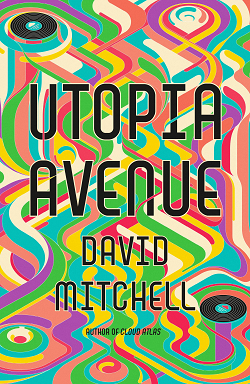Book Review: Utopia Avenue by David Mitchell

David Mitchell is my favorite author, and Cloud Atlas is one of my favorite novels of all time. All other books are doomed to suffer in comparison.
Sorry, Utopia Avenue, you started off on the back foot.
The prose in this novel is so similar in feel to Mitchell’s previous work and the setting is part of the expansive Mitchellverse that weaves through each of his stories. I approached with high expectations.
Maybe I desired too much from it. Maybe that ultimately doomed my opinion of the book.
We see a familiar cast of characters throughout the novel’s substantial 550+ pages from the 1960s rock scene, but also many appearances by characters from Mitchell’s other books. I’ll try not to spoil anything here, but some of these characters are significantly more impactful to the story than others. One of the more jarring of these sends the novel careening into deep left field. I mean, like, a way-past-the-bleachers-and-into-the-parking-lot kind of thing, given where the story had taken us until that point. He does eventually pull the story back into familiar territory, but it left me to wonder if we needed that aspect of the story at all.
The novel reads like Mitchell’s love letter to music, about which he is clearly and intensely passionate. It’s indulgent. He writes lyrics for Utopia Avenue’s hit songs, he describes the qualities of music in glorious detail, we have delightful cameos from famous musicians both pre- and post-fame. But he’s more focused on celebrating his love for music than on developing the depth of his characters.
The story is a straightforward drama that plays out the biography of a band. The characters each have their own personality, their own unique persona - Elf is the hyper-talented but marginalized-because-female keyboardist, Dean is rough-edged boy from the wrong side of the tracks, Griff is the gruff and practical drummer, Jasper is the tortured artist, but everyone meshes so easily that their coming-together feels a little too perfect, a little too set-up. The band face misfortune and they persevere and emerge with their relationship intact, but I didn’t fear for their well-being or care for them at any more than a superficial level. The story never swings for the fences, except for maybe that one part I mentioned earlier, which, again, felt remarkably out of place.
While it’s not that good for a David Mitchell book – it’s possibly my least favorite of his – it’s fun, and even a decent book compared to the contemporary landscape. It’s entertaining and I legitimately enjoyed reading it, but it lacks the profundity that might elevate it to the level of a truly compelling story.